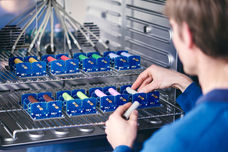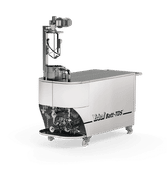Breakthrough in zinc-based rechargeable batteries: A safer, sustainable alternative
Case Western Reserve University researcher advances zinc-sulfur battery technology
Rechargeable lithium-ion batteries power everything from electric vehicles to wearable devices. But new research from Case Western Reserve University suggests that a more sustainable and cost-effective alternative may lie in zinc-based batteries.

Schematic illustration of aqueous zinc-sulfur batteries. On left: in water, on right: with polymer and zinc-iodide additives. The additives improve the stability, reducing dendrite growth and enhancing the longevity of the battery.
Chase Cao/Angewandte Chemie
In a study published recently in Angewandte Chemie, researchers announced a significant step toward creating high-performance, low-cost zinc-sulfur batteries.
“This research marks a major step forward in the development of safer and more sustainable energy storage solutions,” said Chase Cao, a principal investigator and assistant professor of mechanical and aerospace engineering at Case School of Engineering. “Aqueous zinc-sulfur batteries offer the potential to power a wide range of applications—from renewable energy systems to portable electronics—with reduced environmental impact and reliance on scarce materials.”
Lithium-ion batteries, though widely used, are expensive, rely on relatively rare materials and are complex to manufacture. In contrast, zinc-sulfur batteries use more abundant and inexpensive materials and have fewer environmental and safety concerns.
However, challenges such as zinc-anode corrosion, low conductivity and dendrite growth have historically hindered their commercial viability.
Cao’s team overcame these obstacles by introducing two key additives: propylene glycol methyl ether and zinc-iodide. This technology delivered several crucial improvements: enhanced energy capacity by 20%, improved conductivity and stability and inhibited the growth of zinc dendrites.
If the dendrites connect the positive and negative sides of the battery, it can short out and cause a fire—another major problem with lithium-ion batteries.
“These additives not only enhance battery efficiency, but also address long-standing safety concerns by mitigating dendrite formation,” said Guiyin Xu, professor at Donghua University in Shanghai and co-senior author. “The result is a compact, higher-density battery that can recharge more times without significant degradation.”
The implications of this breakthrough extend beyond affordability and safety. Zinc-sulfur batteries have a higher energy density than lithium-ion counterparts, enabling smaller, longer-lasting designs. This could be transformative for renewable energy storage and devices that demand reliability and efficiency.
Cao’s primary interest in developing better batteries is for novel soft robotics and advanced sensing systems, both of which rely on high-capacity, long-lived batteries. For example, he’s developing biologically inspired swimming robots, whose endurance relies on durable, lightweight batteries that can power long missions without failure—the robot can’t run out mid-mission or will never come back. Cao, who directs the Soft Machines and Electronics Laboratory at CWRU, is also developing new technologies for space exploration and farming, as well as for removing ubiquitous and dangerous space debris.
The research was also conducted with researchers from Fudan University in Shanghai and The Hong Kong University of Science and Technology.
Original publication
Other news from the department science
These products might interest you
Most read news
More news from our other portals
See the theme worlds for related content
Topic World Battery Technology
The topic world Battery Technology combines relevant knowledge in a unique way. Here you will find everything about suppliers and their products, webinars, white papers, catalogs and brochures.

Topic World Battery Technology
The topic world Battery Technology combines relevant knowledge in a unique way. Here you will find everything about suppliers and their products, webinars, white papers, catalogs and brochures.


































































